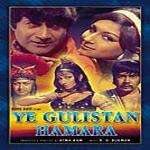Yeh Gulistan Hamara
| Yeh Gulistan Hamara | |
|---|---|
 | |
| Directed by | Atma Ram |
| Music by | S D Burman |
Release dates | 1972 |
| Country | India |
| Language | Hindi |
Yeh Gulistan Hamara is a 1972 Bollywood drama film directed by Atma Ram. The film stars Dev Anand, Sharmila Tagore, Pran, Sujit Kumar, and Johny Walker, and music by S. D. Burman. Dialogue and Screenplay are by Wajahat Mirza. The films depicts a tribal community living on the border with China; the song "Mera Naam Aao" was considered particularly offensive to the Ao Naga community in Nagaland.[1]
Plot
India is worried about its north eastern residents who are cut off from the mainland and are generally backward, illiterate and under developed. The government appoints special officer cum civil engineer Vijay (Dev Anand) to construct a bridge over a river next to the tribal village of Ding in the north eastern part of India. Ding is ruled by the cruel and autocratic Deng Do Rani (Pran) and his henchmen Haku (Jankidas), Teju (Sujit Kumar) and trusted fighter Soo Reni (Sharmila Tagore), a beautiful girl. Deng Do Rani wants to sabotage the construction and sends Soo Reni and other warriors to demolish the bridge. They are captured by Vijay's officers and treated with respect and equality. Deng Do Rani sends others to kill the band captured, and the Indian Officers under the leadership of Vijay fight bravely to protect them. Soo Reni and her companions have a change of heart and pledge to support Vijay in his mission. Vijay and Soo Reni also fall in love with each other.
Cast
- Dev Anand as Vijay
- Sharmila Tagore as Soo Reni
- Pran as Deng Do Rani
- Sujit Kumar as Teju
- Kanan Kaushal as Mrs. Barua
- Lalita Pawar as Soo Reni's Mother
- Ramesh Deo as Inspector Barua
- Raj Mehra as Pal
- D.K. Sapru as Salvatore (as Sapru)
- Keshto Mukherjee as Soldier
- G. Asrani as Asrani
- Jankidas as Haku
- Iftekhar as Vijay's Captain
Music
| Song | Singer |
|---|---|
| He Suno Meri Baat | Kishore Kumar |
| Gori Gori Gaun Ki | Kishore Kumar & Lata Mangeshkar |
| Kya Yeh Zindagi Hai | Lata Mangeshkar |
| Mere Paas Aao Ho Mere Paas Aao | Lata Mangeshkar & Danny Denzongpa |
| O Tushima Ri Tushima | Lata Mangeshkar |
| Raina Soyi Soyi | Lata Mangeshkar, R. D. Burman & S. D. Burman |
Trivia
Some scenes of the film were shot in Arunachal Pradesh.[2]
References
- ↑ Banaji, Shakuntala (2011). South Asian Media Cultures: Audiences, Representations, Contexts. Anthem Press. p. 32. ISBN 978-1-84331-320-5. Retrieved 25 May 2013.
- ↑ "Arunachal: Producers pay for hall, tickets for screening local films".